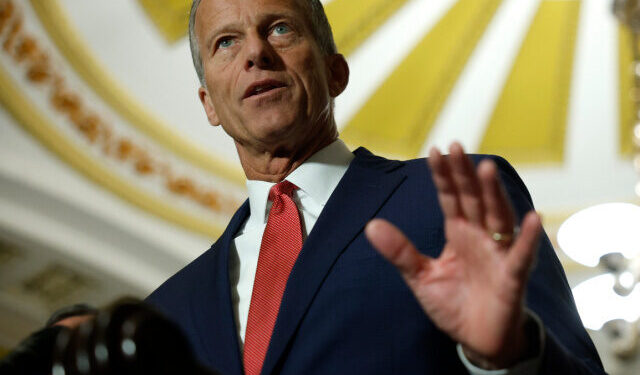In Washington, Senate Majority Leader John Thune has taken decisive steps to break through the unprecedented blockade erected by Senate Democrats against President Trump’s nominees. For months, Minority Leader Chuck Schumer has used procedural tricks to grind confirmations to a halt, refusing even the traditional courtesies of voice votes or unanimous consent. It is the first time in American history that a president has been denied this basic norm, and the cost has been high—not only in wasted time but in undermining national security and the ability of government agencies to function effectively.
Thune has spent the past two weeks putting in place a procedural shift that clears the path for confirmations to move forward in large blocs, bypassing the obstruction. Beginning Thursday, the Senate is set to confirm 48 Trump nominees, many of whom enjoy bipartisan support. These include figures such as Kimberly Guilfoyle, nominated to serve as U.S. Ambassador to Greece, and dozens of others whose appointments are widely seen as both necessary and overdue.
“As we’ve discussed in the past, President Trump deserves to have his team members in place so he can enact his agenda which the American people voted for last November,” Thune told Breitbart News. “He’s the only president on record in history to not have a single civilian nominee confirmed via voice vote or unanimous consent at this point in his presidency. So the Democrats’ long, unprecedented blockade has gone on for way too long and it’s going to end soon and we intend to start that this week.”
For decades, the Senate has operated on a measure of trust and mutual recognition that elections have consequences. When a president wins office, both parties have historically allowed broadly qualified nominees to move through swiftly, recognizing that an administration must be staffed to function. But Schumer has broken with that tradition, rejecting even bipartisan deals that Republicans proposed to speed up the process. This refusal has left key ambassador posts and national security roles vacant, weakening America’s posture abroad at a time when threats from rivals like China, Russia, and Iran demand a steady hand.
Thune emphasized the stakes, noting, “That’s absolutely accurate, the Senate Democrats, because of their Trump Derangement Syndrome, are putting America’s national security interests at risk all around the world. These are key positions that need to be filled, and in the past they would have been filled by unanimous consent because everybody recognized that a president who wins is a duly elected president and won a huge mandate in an election and deserves to have their team in place.”
In this light, the Republican unity behind Thune’s maneuver is notable. All 53 GOP senators backed the change, recognizing that the obstruction had become not only an insult to tradition but a genuine danger. Thune explained, “So this Schumer blockade has got to come to a close, and for all the reasons that you mentioned, chief among those always is national security. We live in a dangerous world. We need representation in a lot of these key posts around the world today, and the Democrats have been blocking it now for going on nine months since the President took office.”
After Thursday’s initial batch of confirmations, the Senate plans even larger blocs to clear the backlog. Schumer has dismissed many of Trump’s nominees as “historically unqualified,” but the facts undercut that claim. As Thune pointed out, “Schumer’s answer to this is these are historically unqualified nominees. Well, if they’re historically unqualified, ‘Chuck, why are Democrats voting for them coming out of the committee—in some cases with big numbers?’ There are 24 of these nominees who came out of the committee with a majority of the Democrats on the committee voting for them.”
The reality is that many of these nominees had bipartisan approval at the committee stage but were still stalled by Schumer’s tactics once they reached the floor. By forcing every single confirmation to be handled individually, Democrats managed to tie up the Senate calendar and slow the administration’s ability to govern—an obstructionist strategy with no precedent in American history.
Looking ahead, Thune signaled that more substantial batches of confirmations are coming. “Yeah, there will be, and we’re going to try—we’re into the first 48 because they’re bipartisan… So this first 48 is going to be all Democrat-supported one[s]. They’re going to be bipartisan nominees that will be clearing, but then we’re going to clear the backlog and the next tranche will be much larger because it will catch us up.”
The Senate leader didn’t mince words about the motivation behind the blockade. “I understand the pressure Schumer’s under from his political base because this Trump Derangement Syndrome is—it’s beyond. I tell people, it’s almost pathological, but we can’t allow that to keep [Trump] from getting the people in these positions so they can carry out their responsibilities not only to keep the country safe but to keep it strong and hopefully more prosperous in the future.”
In the end, what Thune has done is restore a measure of common sense and fairness to a process Democrats deliberately broke. The American people elected President Trump to carry out an agenda, and that requires a functioning team. By standing united, Republicans have ensured that the machinery of government will not be paralyzed by partisan gamesmanship. The move not only secures critical national security posts but also reasserts the principle that elections have consequences—a truth Washington too often forgets.




















